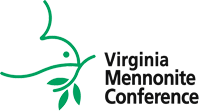
Building frameworks of Christian formation at Huntington
by VMC Staff
For over six months, the new Christian Formation Team (CFT) at Huntington Mennonite Church has been wrestling with what an Anabaptist Christian formation “framework” might look like.
The task assigned to our group comes from newly-formulated congregational guidelines with the following purpose statement: “Building on the foundation of the life and teachings of Jesus, [CFT] shall encourage a growing personal relationship with God and others and the development of mature character and faith. The CFT shall coordinate spiritual formation themes through teaching, mentoring, and modeling.”
Like many congregations, we have time-honored ways of working at “Christian education” through Sunday school curriculum and special teaching series. But our new guidelines ask for more formative thinking around a strategy for lifelong growth into Christian maturity. Is this something we can plan for? Measure? What would such a framework look like?
Our discussions ranged from expectations around baptism and church membership to Mennonite published materials to sporadic attendance and many other issues that impact Christian formation.
Over the past 15 years at Huntington, the mentor/mentee program has become one of our Christian formation success stories. All junior youth (beginning grade 6) receive a mentor who will walk with them until they graduate from high school.
This is a major commitment for both mentor and mentee, and these relationships have produced some of the most meaningful Christian formation in our congregation. But now we are asking how this very significant and successful piece of Christian formation will fit into a framework that encourages lifelong Christian maturity.
Our search for good thinking and materials led us to recently produced resources from the denominational level. Several Mennonite Church USA documents and a new teaching series, Begin Anew, have been using the simple, yet powerful model of Believe, Belong, Become, Behave.
Does this describe a linear formation progression, or are there some cyclical aspects to this dialectic? Should belong come before believe? These are not new questions but they provided rich discussion as we grappled with our task to formulate a framework.
We are currently testing the Begin Anew curriculum with several adult classes, combining persons both younger and older in the faith. We believe the new series will be helpful for furthering Christian formation. We find the Shine curriculum very helpful for children into Junior High.
We wonder if our denomination could develop a more focused basic faith curriculum for junior and senior youth that could supplement what we have already from Michele Hershberger (God’s Story, Our Story) and other older works.
We continue to develop a working framework for HMC and again have found helpful reflection and inspired thinking from denominational pieces, Mennonite World Conference (What We Believe Together), and our various mission boards.
Although it is still a work in progress, the following statement is our CFT framework of understanding: “Christian formation at Huntington shall support Christian growth by assisting persons to believe in God, belong in community, and become mature in Christ through teaching, experiences, and activities that encourage believers to cultivate Jesus as the center of faith, community as the center of life, and reconciliation as the center of work.”
We expect further refinement as we endeavor to encourage growing personal relationships with God and others toward the development of mature character and faith at Huntington Mennonite Church.
